 Christopher Columbus Christopher Columbus
"It was the Lord who put into my mind (I could feel his hand upon me) the fact that it would be possible to sail from here to the Indies. All who heard of my project rejected it with laughter, ridiculing me. There is no question that the inspiration was from the Holy Spirit, because He comforted me with rays of marvelous inspiration from the Holy Scriptures..."
- Christopher Columbus
[His Journal the 'Book of Prophecies', 1492]
"Therefore let the king and queen, the princes and their most fortunate kingdoms, and all other countries of Christendom give thanks to our Lord and Saviour Jesus Christ, who has bestowed upon us so great a victory and gift. Let religious processions be solemnized; let sacred festivals be given; let the churches be covered with festive garlands. Let Christ rejoice on earth, as he rejoices in heaven, when he foresees coming to salvation so many souls of people hitherto lost."
- Christopher Columbus
[His Journal the 'Book of Prophecies', 1492]
 William Bradford William Bradford
"Being thus arrived in a good harbor, and brought safe to land, they fell upon their knees and blessed the God of Heaven who had brought them over the vast and furious ocean, and delivered them from all the perils and miseries thereof, again to set their feet on the firm and stable earth, their proper element. "
- William Bradford
[In his work 'Of Plymouth Plantation', November 11, 1620]
"Thus out of small beginings greater things have been produced by His hand that made all things of nothing, and gives being to all things that are; and, as one small candle may light a thousand, so the light here kindled hath shone unto many, yea in some sort to our whole nation; let the glorious name of Jehovah have all the praise. "
- William Bradford
[In his work 'Of Plymouth Plantation', November 11, 1620]
"Last and not least, they cherished a great hope and inward zeal of laying good foundations, or at least making some ways toward it, for the propagation and advance of the gospel of the kingdom of Christ in the remote parts of the world, even though they should be but stepping stones to others in the performance of so great a work. "
- William Bradford
[In his work 'Of Plymouth Plantation', November 11, 1620]
"In as much as the great Father has given us this year an abundant harvest of Indian corn, wheat, peas, beans, squashes, and garden vegetable, and has made the forests to abound with game and the sea with fish and clams, and inasmuch as he has protected us from the ravages of the savages, has spared us from pestilence and disease, has granted us freedom to worship God according to the dictates of our own conscience; now I, your magistrate, do proclaim that all ye Pilgrims, with your wives and ye little ones, do gather at ye meeting house, on ye hill...on the third year since ye...landed on Pilgrim Rock, there to listen to your pastor and render thanksgiving to ye Almighty God for all His blessings."
- William Bradford
[Official Thanksgiving Proclamation, November 29, 1623]
 John Winthrop John Winthrop
"For we must consider that we shall be as a City upon a hill. The eyes of all people are upon us. So that if we shall deal falsely with our God in this work we have undertaken, and so cause him to withdraw his present help from us, we shall be made a story and a byword throughout the world."
- John Winthrop
[A Model of Christian Charity, June 11, 1630]
"Now the onely way to avoid this shipwreck, and to provide for our posterity, is to follow the counsel of Micah,to doe justly, to love mercy, to walk humbly with our God. For this end, wee must be knit together, in this work, as one man. We must entertain each other in brotherly affection. We must be willing to abridge ourselves of our superfluities, for the supply of other's necessities. We must uphold a familiar commerce together in all meekness, gentleness, patience and liberality. We must delight in each other; make other's conditions our own; rejoice together, mourn together, labour and suffer together, always having before our eyes our commission and community in the work, as members of the same body. So shall we keep the unity of the spirit in the bond of peace.The Lord will be our God, and delight to dwell among us, as his one people, and will command a blessing upon us in all our ways. So that we shall see much more of his wisdom, power, goodness and truth, than formerly we have been acquainted with. We shall find that the God of Israel is among us, when ten of us shall be able to resist a thousand of our enemies; when he shall make us a praise and glory that men shall say of succeeding plantations, "the Lord make it likely that of New England.."
- John Winthrop
[A Model of Christian Charity, June 11, 1630]
"We are a Company, professing ourselves fellow members of Christ, [and thus] we ought to account ourselves knit together by this bond of love...For the work we have in hand, it is by a mutual consent through a special overruling providence, and a more than ordinary appropobation of the Churches of Christ to seek out a place of Cohabitation and Consortship under a due form of Government both civil and ecclesiastical...."
- John Winthrop
[A Model of Christian Charity, June 11, 1630]
"Whereas we all came to these parts of America with the same end and aim, namely, to advance the kingdom of our Lord Jesus Christ, and to enjoy the liberties of the Gospel thereof with purities and peace, and for preserving and propogating the truth and liberties of the Gospel."
- John Winthrop
[Upon Organizing the New England Confederation, May 19, 1643]
 John Smith John Smith
"Then seeing that we are not borne for our selves, but each to helpe other, and our abilities are much alike at the houre of our birth, and the minute of our death: Seeing our good deeds, or our badde, by faith in Christs merits, is all we have to carrie our soules to heaven, or hell: Seeing honour is our lives ambition; and our ambition after death, to have have an honorable memorie of our life: and seeing noe meanes wee would bee abated of the dignities and glories of our Predecessors; let us imitate their virtues to be worthily their successors."
- John Smith
[From his work 'A Description of New England', 1615]
"So then here is a place a nurse for souldiers, a practise for marriners, a trade for marchants, a reward for the good, and that which is most of all, a businesse (most acceptable to God) to bring such poore infidels to the true knowledge of God and his holy Gospel."
- John Smith
[From his work 'A Description of New England', 1615]
"And many a score of the worst of winter moneths lived in the fields, yet to have lived neere 37 yeares in the midst of wars, pestilence and famine; by which, many an hundred thousand have died about mee, and scarce five livings of them went first with me to Virginia, and see the fruits of my labours thus well begin to prosper: Though I have but my labour for my paines, have I not much reason both privately and publikely to acknowledge it and give God thankes, whose omnipotent power onely delivered me to doe the utmost of my best to make his name knowne in those remote parts of the world, and his loving mercy to such a miserable sinner."
- John Smith
[From his work 'A Description of New England', 1615]
"We now remaining being in good health, all our men wel contented, free from mutinies, in love one with another, and as we hope in a continual peace with the Indians, where we doubt not but by God's gracious assistance, and the adventurers willing minds and speedie furtherance to so honorable an action in after times, to see our Nation to enjoy a Country, not onely exceeding pleasant for habitation, but also very profitable for comerce in general, no doubt pleasing to Almighty God, honorable to our gracious Sovereign, and commodious generally to the whole Kingdom."
- John Smith
[From his work 'A True Relation of Occurences and Accidents in Virginia', 1608]
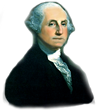 George
Washington George
Washington
"It is the duty of all Nations to acknowledge the providence of Almighty God, to obey his will, to be grateful for his benefits, and humbly to implore his protection and favors."
-- George Washington
[Thanksgiving Proclamation, October 3, 1789]
"The liberty enjoyed by the people of these states of worshipping Almighty God agreeable to their conscience, is not only among the choicest of their blessings, but also of their rights."
-- George Washington
[Letter to the Annual Meeting of Quakers, September 1789]
"While we are zealously performing the duties of good citizens and soldiers, we certainly ought not to be inattentive to the higher duties of religion. To the distinguished character of Patriot, it should be our highest Glory to laud the more distinguished Character of Christian. The signal instances of Providential goodness which we have experienced and which have now almost crowned our labors with complete success demand from us a peculiar manner the warmest returns of gratitude and piety to the Supreme Author of all good."
-- George Washington
[Orders issued on May 2, 1778 by George Washington to his troops at Valley Forge]
"The General hopes and trusts that every officer and man, will endeavor so to live, and act, as becomes a Christian Soldier defending the dearest Rights and Liberties of his country."
-- George Washington
[A General Order issued on July 9, 1776, the same day the Continental Congress authorized chaplains for use in the Continental Army]
"You
do well to wish to learn our arts and ways of life, and above
all, the religion of Jesus Christ. These will make you a greater
and happier people than you are. Congress will do everything
they can do assist you in this wise intention."
-- George Washington
[Upon learning the Chiefs of the Delaware Indian Tribe wanted
three youths to be trained in American schools, May 12, 1779]
"Of all the dispositions and habits which lead to political
prosperity, Religion and morality are indispensable supports.
In vain would that man claim the tribute of Patriotism, who
would labor to subvert these great Pillars of human happiness,
these firmest props of the duties of Men and Citizens. The mere
Politician, equally with the pious man, ought to respect and
cherish them."
-- George Washington
[Farewell Address to the Nation, September 19, 1796]
"Let it simply be asked where is the security for prosperity,
for reputation, for life; if the sense of religious obligation
desert the oaths, which are the instruments of investigation
in the Courts of Justice? And let us with caution indulge the
supposition, that morality can be maintained without religion."
-- George Washington
[Farewell Address to the Nation, September 19, 1796]
"The Hand of Providence has been so conspicuous in all
this, that he must be worse than an infidel
that lacks faith, and more wicked that has not gratitude to
acknowledge his obligations."
--George Washington
[On August 20, 1778, General George Washington wrote this to
his friend, Brigadier General Thomas Nelson in Virginia]
"The General most earnestly requires and expects a due
observance of those articles of war established for the government
of the Army which forbid profane cursing, swearing and drunkenness.
And in like manner he requires and expects of all officers and
soldiers not engaged in actual duty, a punctual attendance of
Divine services, to implore the blessing of Heaven upon the
means used for our safety and defense."
-- George Washington
[Orders issued on July 4, 1775 by General George Washington
to his troops, 2 days after taking command of the Continental
Army]
"The General orders this day to be religiously observed
by the forces under his Command, exactly in manner directed
by the Continental Congress. It is therefore strictly enjoined
on all officers and soldiers to attend Divine service. And it
is expected that all those who go to worship do take their arms,
ammunition and accoutrements and are prepared for immediate
action, if called upon."
-- George Washington
[Orders issued on July 20, 1775 by General George Washington
to his troops]
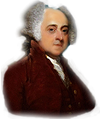 John Adams John Adams
"Suppose a nation in some distant region should take
the Bible for their only law book, and every member should regulate
his conduct by the precepts there exhibited! Every member would
be obliged in conscience, to temperance, frugality, and industry;
to justice, kindness, and charity towards his fellow men; and
to piety, love and reverence toward Almighty God...What a Eutopia,
what a Paradise would this region be."
- John Adams
[Personal Journal Entry from February 22, 1756]
"I always consider the settlement of America with reverence
and wonder, as the opening of a grand scene and design in Providence
for the illumination of the ignorant, and the emancipation of
the slavish part of mankind all over the earth."
- John Adams
[Personal Notes for A Dissertation on the Canon and Feudal Law
in February 1765]
"Statesmen, my dear Sir, may plan and speculate for
liberty, but it Religion and Morality alone, which can establish
the Principles upon which Freedom can securely stand. The only
foundation of a free Constitution is pure Virtue, and if this
cannot be inspired into our People in a greater Measure, than
they have it now, they may change their Rulers and the forms
of Government, but they will not obtain lasting liberty."
- John Adams
[Personal Notes from June 21, 1776]
"Before God, I believe the hour has come. My judgement
approves this measure, and my whole heart is in it. All that
I have, and all that I am, and all that I hope in this life,
I am now ready here to stake upon it. And I leave off as I began,
that live or die, survive or perish, I am for the Declaration.
It is my living sentiment, and by the blessing of God it shall
be my dying sentiment. Independence now, and Independence for
ever!"
- John Adams
[Profound Speech delivered to the Continental Congress on July
1, 1776]
"The Christian religions is, above all the Religions
that ever prevailed or existed in ancient or modern times, the
religion of Wisdom, Virtue, Equity, and Humanity."
- John Adams
[Journal Entry in response to Thomas Paine on July 26, 1796]
"We have no government armed with power capable of contending
with human passions unbridled by morality and religion. Avarice,
ambition, revenge, or gallantry, would break the strongest cords
of our Constitution as a whale goes through a net. Our constitution
was made only for a moral and religious people, it is wholly
inadequate for the governing of any other."
- John Adams
[Address to the military on October 11, 1798]
"...impore His pardoning mercy, through the great Mediator and Redeemer, for our past transgressions, and that through the grace of His Holy Spirit we may be disposed and enabled to yield a more suitable obedience...that He would interpose to arrest the progress of that impiety and licentiousness in principle and practice so offensive to Himself and so ruinous to mankind; that He would make us deeply sensible that "rightousness exalteth a nation but sin is a reproach to any people."
- John Adams
[Upon proclaiming a National Fast Day on March 6, 1799]
"...and with humble reverence, I feel it my duty to add, if a veneration for the religion of a people, who profess and call themselves Christians, and a fixed resolution to consider a decent respect for Christianity among the best recommendations for public service, can enable me, in any degree, to comply with your wishes, it shall be my strenuous endeavor that this sagacious injunction of the two Houses shall not be without effect."
- John Adams
[Inaugural Address on March 4, 1797]
"And may that Being who is supreme over all, the Patron of Order, the Fountain of Justice, and the Protector in all ages of the world of virtuous liberty, continue His blessing upon this nation and its Government and give it all possible success and duration consistent with the ends of His providence.."
- John Adams
[Inaugural Address on March 4, 1797]
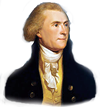 Thomas
Jefferson Thomas
Jefferson
"The God who gave us life gave us liberty. And can the liberties
of a nation be thought secure when we have removed their only
firm basis, a conviction in the minds of the people that these
liberties are a Gift of God?"
- Thomas Jefferson
[Stated in 1781 in Query XVIII of his Notes on the State of
Virginia, Excerpts engraved on the Jefferson Memorial in Washington,
D.C.]
"Resistance to tyrants is obedience to God."
- Thomas Jefferson
[Used as the motto on his official seal]
"I have sworn upon the alter of God eternal hostility
against every form of tyranny over the mind of man."
- Thomas Jefferson
[In a letter to Dr. Benjamin Rush, September 23, 1800]
"Let us, then, with courage and confidence pursue our
own federal and republican principles ... enlightened by a benign
religion, professed, indeed, and practiced in various forms,
yet all of them including acknowledging and adoring an overruling
Providence, which by all its dispensations proves that it delights
in the happiness of man here and his greater happiness hereafter."
- Thomas Jefferson
[First Inaugural Address, 1801]
"And may that Infinite Power which rules the destinies
of the universe, lead our concils to what is best, and give
them a favorable issue for your peace and prosperity."
- Thomas Jefferson
[First Inaugural Address, 1801]
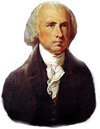 James Madison James Madison
"The belief in a God All Powerful wise and good, is so essential to the moral order of the world and to the happiness of man, that arguments which enforce it cannot be drawn from too many sources nor adapted with too much solicitude to the different characters and capacities impressed with it."
- James Madison
[Letter to Frederick Beasley, November 20, 1825]
"A watchful eye must be kept on ourselves lest while
we are building ideal monuments of Renown and Bliss here we
neglect to have our names enrolled in the Annals of Heaven."
- James Madison
[In a letter to William Bradford on November 9, 1772]
"It is the duty of every man to render to the Creator
such homage, and such only, as he believes to be acceptable to him. This duty is precedent both in order of time and degree of obligation, to the claims of Civil Society. Before any man can be considered as a member of
Civil Society, he must be considered as a subject of the Governor
of the Universe."
- James Madison
[In a 1785 session of the General Assembly of the State of Virginia,
explaining his "Religious Freedom, A Memorial Remonstrance"]
"We have all been encouraged to feel in the guardianship
and guidance of that Almighty Being, whose power regulates the
destiny of nations."
- James Madison
[Inaugural Address on March 4, 1809]
"[The] principles of morality and religion... are
the best foundation of national happiness."
- James Madison
[In a message to Congress on February 24, 1813]
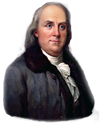 Benjamin Franklin Benjamin Franklin
"I've lived, Sir, a long time, and the longer I live, the more convincing Proofs I see of this Truth - That God governs in the Affairs of Men. And if a sparrow cannot fall to the ground without his Notice, is it probable that an Empire can rise without his Aid? We have been assured, Sir, in the Sacred Writings, that except the Lord build the House they labor in vain who build it. I firmly believe this, - and I also believe that without his concurring Aid, we shall succeed in this political Building no better than the Builders of Babel: We shall be divided by our little partial local interests; our Projects will be confounded, and we ourselves shall become a Reproach and Bye word down to future Ages. "
- Benjamin Franklin
[Speech to the Constitutional Convention, on June 28, 1787]
"Here is my Creed. I believe in one God, the Creator of the Universe. That He governs it by His Providence. That He ought to be worshipped. That the most acceptable service we render to Him is in doing good to His other Children. That the soul of Man is immortal, and will be treated with Justice in another Life respecting its conduct in this. These I take to be the fundamental points in all sound Religion, and I regard them as you do in whatever Sect I meet with them. As to Jesus of Nazareth, my Opinion of whom you particular desire, I think the System of Morals and his Religion, as he left them to us, is the best the World ever saw, or is likely to see."
- Benjamin Franklin
[Letter to Ezra Stiles, President of Yale University, on March 9, 1790]
"It is that particular wise and good God, who is the Author and Owner of our system, that I propose for the Object of my praise and adoration. For I conceive that He has in Himself some of those passions He has planted in us, and that, since He has given us reason whereby we are capable of observing His wisdom in the Creation, He is not above caring for us, being pleas'd with our praise, and offended when we slight Him, or neglect His Glory."
- Benjamin Franklin
[From his "Articles of Belief and Acts of Religion"]
"Whoever shall introduce into public affairs the principals of primitive Christianity will change the face of the world."
- Benjamin Franklin
[A letter to the French ministry, March 1778]
"That Being, who gave me existence, and through almost threescore years has been continually showering his favors upon me, whose very chastisements have been blessings to me ; can I doubt that he loves me? And, if he loves me, can I doubt that he will go on to take care of me, not only here but hereafter? This to some may seem presumption ; to me it appears the best grounded hope ; hope of the future built on experience of the past."
- Benjamin Franklin
[Letter to George Whitefield, June 19, 1764]
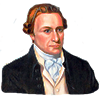 Patrick Henry Patrick Henry
"This is all the inheritance I give to my dear family.
The religion of Christ will give them one which will make them
rich indeed."
- Patrick Henry
[From his "Last Will and Testament" on November 20,
1798]
"The great pillars of all government and of social life [are]
virtue, morality, and religion. This is the armor, my friend,
and this alone that renders us invincible. These are the tactics
we should study. If we lose these, we are conquered, fallen
indeed...so long as our manners and principles remain sound,
there is no danger."
- Patrick Henry
[A letter to Archibald Blair on January 8, 1789]
"Is life so dear or peace so sweet as to be purchased at
the price of chains and slavery? Forbid it, Almighty God, I
know not what course others may take, but give me liberty or
give me death!"
- Patrick Henry
[At the Second Virginia Convention on March 23, 1775]
"The Bible is worth all other books which have ever been
printed."
- Patrick Henry
[Once interrupted while engaging in reading Scriptures, he held
up the Bible and said this]
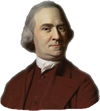 Samuel Adams Samuel Adams
"Let divines and philosophers, statesmen and patriots,
unite their endeavors to renovate the age, by impressing the
minds of men with the importance of educating their little boys
and girls, of inculcating in the minds of youth the fear and
love of the Deity and universal philanthropy, and, in subordination
to these great principles, the love of their country; of instructing
them in the art of self-government without which they never
can act a wise part in the government of societies, great or
small; in short, of leading them in the study and practice of
the exalted virtues of the Christian system."
- Samuel Adams
[A letter to his cousin John Adams who was Vice-President on
October 4, 1790]
"The right to freedom being the gift of the Almighty...The
rights of the colonists as Christians...may be best understood
by reading and carefully studying the institution of The Great
Law Giver and Head of the Christian Church, which are to be
found clearly written and promulgated in the New Testament."
- Samuel Adams
[From hiw work "The Rights of the Colonists" in 1772]
"A general dissolution of principles and manners will
more surely overthrow the liberties of America than the whole
force of the common enemy. While the people are virtuous they
cannot be subdued; but when they lose their virtue they will
be ready to surrender their liberties to the first external
or internal invader...If virtue and knowledge are diffused among
the people, they will never be enslaved. This will be their
great security."
- Samuel Adams
[A letter to James Warren on February 12, 1779]
"And if we now cast our eyes over the nations of the earth we shall find, that instead of possessing the pure religion of the gospel, they may be divided either into infidels who deny the truth, or politicians who make religion a stalking horse for their ambition, or professors, who walk in the trammels of orthodoxy, and are more attentive to the traditions and ordinances of men than to the oracles of truth. The civil magistrate has everywhere contaminated religion by making it an engine of policy."
- Samuel Adams
[A speech at the State House in Pennsylvania on August 1, 1776]
"We have this day restored the Sovereign, to whom alone men ought to be obedient. He reigns in Heaven, and with a propitious eye beholds his subjects assuming that freedom of thought, and dignity of self-direction which He bestowed on them. From the rising to the setting sun, may His kingdom come."
- Samuel Adams
[A speech at the State House in Pennsylvania on August 1, 1776]
"And, brethren and fellow-countrymen, if it was ever granted to mortals to trace the designs of Providence, and interpret its manifestations in favor of their cause, we may, with humility of soul, cry out, Not unto us, not unto us, but to thy name be the praise. The confusion of the devices among our enemies against them, have done almost as much towards our success as either our councils or our arms."
- Samuel Adams
[A speech at the State House in Pennsylvania on August 1, 1776]
 John Hancock John Hancock
"But I thank God, that America abounds in men who are superior to all temptation, whom nothing can divert from a steady pursuit of the interest of their country; who are at once its ornament and safeguard. And sure as I am, I should not incur your displeasure, if I paid a respect, so justly due to their much honored characters, in this place...From them let us, my friends, take example; from them let us catch the divine enthusiasm..."
- John Hancock
[Speech after the Bostom Massacre, March 5, 1774]
"[It] hereby is recommended that the People of this Colony of all Denominations...set apart as a Day of Public Humiliation, Fasting and Prayer...to confess the sins...to implore the Forgiveness of all our Transgression...and a blessing on...the union of the American Colonies in Defence of their Rights may be preserved and confirmed...and that America may soon behold a gracious Interposition of Heaven. "
- John Hancock
[Signatory to a Declaration of 'A Day of Public Humiliation, Fasting and Prayer', April 15, 1775]
"The Interposition of Divine Providence in our Favor hath been most abundantly and most graciously manifested, and the Citizens of these United States have every Reason for Praise and Gratitude to the God of their salvation. "
- John Hancock
[Upon Issuing a Proclamation of Thanksgiving to Celebrate the Victory of the Revolutionary War, November 8, 1783]
"I do by and with the Advice of the Council appoint...a Day of Thanksgiving and Prayer, that all the People may then assemble and celebrate...that he hath been pleased to continue to us the Light of the Blessed Gospel...that we also offer up fervent Supplications...to cause pure Religion and Virtue to flourish...and to fill the World with his glory. "
- John Hancock
[Upon Issuing a Proclamation of Thanksgiving to Celebrate the Victory of the Revolutionary War, November 8, 1783]
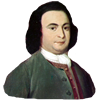 George Mason George Mason
"No free government, or the blessings of liberty, can be
preserved to any people, but by a firm adherence to justice,
moderation, temperance, frugality and virtue, and by frequent
recurrence to fundamental principles."
- George Mason
[part of the Virginia Declaration of Rights, of which George
Mason was author]
"As nations cannot be rewarded or punished in the next world, they must be in this. By an inevitable chain of causes and effects, Providence punishes national sins, by national calamities."
- George Mason
[Debating Slavery during the Constitutional Convention, August 22, 1787]
"The laws of nature are the laws of God, whose authority can be superseded by no power on earth."
- George Mason
[Arguing before the General Court of Vriginia, 1772]
"That Religion, or the Duty which we owe our Creator, and the Manner of discharging it, can be directed only by Reason and Convictions, not by Force or Violence; and therefore all Men are equally entitled to the free exercise of Religion, according to the Dictates of Conscience; and that it is the mutual Duty of all to practice Christian Forbearance, Love, and Charity towards each other."
- George Mason
[Author of the Virginia Bill of Rights, June 12, 1776]
"My soul, I resign into the hands of my Almighty Creator, whose tender mercies are over all His works, who hateth nothing that He hath made and to the Justice and Wisdom of whose dispensation I willingly and cheerfully submit, humbly hoping from His unbounded mercy and benevolence, through the merits of my blessed Savior, a remission of my sins."
- George Mason
[Last Will and Testament, October 7, 1792]
 John Quincy Adams John Quincy Adams
"The highest, the transcendent glory of the American Revolution was this - it connected, in one indissoluble bond, the principles of civil government with the precepts of Christianity."
- John Quincy Adams
[Letter to an autograph collector, April 27, 1837]
"From the day of the Declaration...they (the American people) were bound by the Laws of God, which they all, by the the laws of The Gospel, which they nearly all, acknowledge as the rules of their conduct."
- John Quincy Adams
[July 4, 1821]
"Is it not that, in the chain of human events, the birthday of the nation is indissolubly linked with the birthday of the Savior? That it forms a leading event in the Progress of the Gospel dispensation? Is it not that the Declaration of Independence first organized the social compact on the foundation of the Redeemer's mission upon earth? That it laid the cornerstone of human government upon the first precepts of Christianity and gave to the world the first irreovcable pledge of the fulfillment of the prophecies announced directly from Heaven at the birth of the Savior and predicted by the greatest of the Hebrew prophets 600 years before."
- John Quincy Adams
[Commemorating the 61st Anniversary of the Declaration at Newburyport, July 4, 1837]
"Among the sentiments of most powerful operation upon the human heart, and most highly honorable to the human character, are those of veneration for our forefathers, and of love for our posterity. They form the connecting links between the selfish and the social passions. By the fundamental principle of Christianity, the happiness of the individual is Later-woven, by innumerable and imperceptible ties, with that of his contemporaries: by the power of filial reverence and parental affection, individual existence is extended beyond the limits of individual life, and the happiness of every age is chained in mutual dependence upon that of every other."
- John Quincy Adams
[Commemorating the Landing of the Pilgrims at Plymouth, December 22, 1802]
Noah Webster
"Almost all civil liberty now enjoyed in the world owes its origin to the principles of the Christian religion...By the principles of the Christian religion we are not to understand the decisions of ecclesiastical councils, for they are the opinions of mere men...No, the religion which has introduced civil liberty, is the religion of Christ and his apostles, which enjoins humility, piety, and benevolence; which acknowledges in every person a brother, or a sister, and a citizen with equal rights. This is genuine Christianity, and to this we owe our free constitutions of government...If men would universally cultivate these religious affections and virtuous dispositions, with as much diligence as they cultivate human science and refinement of manners, the world would soon be a terrestrial paradise."
- Noah Webster
[His book 'History of the United States' in 1833]
Benjamin Rush
"The only foundation for a useful education in a republic is to be laid in religion. Without this there can be no virtue, and without virtue there can be no liberty, and liberty is the object and life of all republican governments."
- Benjamin Rush
[On the Mode of Education Proper in a Republic, 1806]
"Without religion morals are the effects of causes as purely physical as pleasant breezes and fruitful seasons."
- Benjamin Rush
[Letter to John Adams, August 20, 1811]
Gouverneur Morris
"The only foundation for a useful education in a republic is to be laid in religion. Without this there can be no virtue, and without virtue there can be no liberty, and liberty is the object and life of all republican governments."
- Gouverneur Morris
[On the Mode of Education Proper in a Republic, 1806]
Additional Quotes
"In God We Trust"
- United States Motto, passed by Congress on April 22, 1864
"One Nation Under God"
- Amended to the United States Pledge of Allegiance by Congress
in 1954
"In the name of God, Amen. We whose names are underwritten, the loyall subjects of our dread sovereign Lord King James...having undertaken, for the glory of God and advancement of the Christian faith, and honor of our king and country, a voyage to plant the first colony in the Northern parts of Virginia, do by these presents solemnly & mutually in the presence of God, and one of another, covenant & combine ourselves together in a civil body politic."
- Mayflower Compact, 1620
"Religion, or the duty which we owe to our creator, and the manner of discharging it, can be directed only by reason and conviction, not by force or violence; and therefore all men are equally entitled to the free exercise of religion, according to the dictates of conscience; and this is the mutual duty of all to practice Christian forbearance, love, and charity towards each other."
- Virginia Bill of Rights, Article 16, June 12, 1776
"It is the right as well as the duty of all men in society, publicly and at stated seasons, to worship the Supreme Being, the great Creator and Preserver of the universe. And no subject shall be hurt, molested, or restrained in his person, liberty, or estate, for worshipping God in the manner and season most agreeable to the dictates of his own conscience; or for his religion profession of sentiments; provided he doth not disturb the public peace, or obstruct others in their religious worship..."
- Massachusetts Bill of Rights, Part of the First, 1780
|